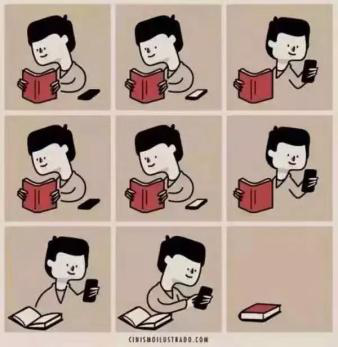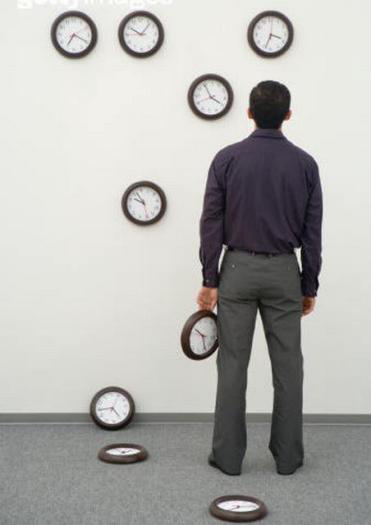

Now, if you want to select a serious illness, then “distraction” can be one of the top three. This is indeed the case. Take a look at the picture below:
I think most people have sympathy. This may be who you were, or who you are now.
We always hold the books with high morale, have an encounter with the words in the book, come to a collision of ideas, always thinking that we have been struggling.
Unfortunately, we are always occupied by all kinds of information.
External interference: In the workplace, we are bombarded with work information from colleagues and bosses; in private, mobile phone entertainment information and friends’ appointments are always calling us…
Internal interference: Our own goals are erratic, we want too much, we want to make great progress, and we don’t want to give up our own spiritual entertainment, and finally struggle with hard work and laziness, wasting time…
The lack of concentration means that dreams are delayed indefinitely.
We occasionally set this goal: This week, I will finish reading this book. So you slumped on the sofa one afternoon, with music playing in your headphones, and opened the first chapter of the book. Suddenly, a song you love very much played in the music, so you can’t help humming it.
When the song is finished, your attention returns to the book again; at this time, your family is back, bringing delicious food. At the call of food, you hold a book in your left hand and delicious food in your right hand, chewing and chatting with your loved ones.
When you realized that you want to read a book again, WeChat sent a message about a meal with a friend.

Finally you thought: forget it today, and watch it tomorrow.
In this way, there are always different disturbances every day, which makes us shirk our original goals. Although we made a promise, we went farther and farther on the road of goals.
On the contrary, eliminating all kinds of interference means that you have led the majority. In my opinion, the lack of concentration implies a lot:
The goal and the lack of goal meaning (didn’t understand why it should be done);
Lack of goal decomposition (how to act);
Lack of a sense of ritual or interference-free mechanism (causing external interference to continue to melt into our brains);
The reward and punishment mechanism in the goal process (you get positive feedback after each focus, forming a virtuous circle, and finally forming a habit);
So from the point of view of the problem, as long as the above is solved, it is equivalent to solving the problem of our concentration.
01. Be clear about what you want most (that is, what is your goal)
For those who have made a lot of achievements in a certain field, they all have one thing in common: a clear goal and constant persistence on this basis.
So, the first series of questions is:
If you don’t have a goal, then you should ask yourself what I want, what kind of career do I want to pursue? Or what kind of things do you want to achieve? If there are too many goals, then which goal is the most important to me at the moment, list the priority.
In fact, this is the most thought-provoking question. It represents what kind of person I want to be, in life or in my career.
1)Misunderstanding of means as ends
For example: We are willing to work hard, so we chose to read books. But reading is only a way of hard work, not a goal. Reading one or two books in the early stage will bring us a sense of inner vanity: “I read the book today and feel very fulfilled”, but this illusion of “honeymoon period” with books will not last long. Don’t treat the way as an end.
2)Actively seek clues to the target
Answering what I want is actually not an easy question. Because we often have no perception of the goal.
Looking at it from another angle, many people have never thought about their career possibilities: photographer or marketing planner?
These often can only stay in the mouth, because they have never been in contact and don’t know what they are going to do, so they can only remain in awe and uncertainty forever.
Get in touch with unknown things or things of interest, and actively seek what you want.
In addition, for ordinary people, goals are often material-oriented (that is, interest is a secondary factor). In this case, it is more important to see that your professional ability is biased, what your personality is suitable for, and doing In the process of finding one’s own strengths, it is also a way to find the right goal.
02. Decomposition goals ( long-term goals and short-term goals)

Clarifying your long-term goals is like finding a support point. We should find more points, or your goals will fall apart soon.
In other words, long-term goals have guiding significance, but they do not have realistic specific guiding significance. So we must break down the goals, find suitable short-term goals, and guide our daily study and work.
Let me briefly describe the “Internet Product Operations Director” as an example: Assuming that “becoming a great Internet Operations Director” is our long-term goal, then we can further split the goal. What capabilities does the operations director need?
Divided from a certain dimension: user operation, event operation, content operation, data analysis, overall planning, other…
These are the capabilities we need to involve, and then we will proceed to the next step.
For example, the above mentioned event operation, then it may require you to understand: event planning, resource integration, channel cooperation, event promotion… These are the subdivision capabilities we need to hunt.
According to the above ability breakdown, use the form to express, and then consider the key points according to your actual situation.
For example: if you have been in contact with public relations activities, then you can start with the ability to operate activities and take the first step towards your ultimate goal; if channel expansion is where your strength lies, then you can develop other capabilities based on that.
After careful consideration and positioning, your sense of purpose will become stronger.

03.Reasonably plan task allocation
1)What ability to do what
We encourage learners to jump out of the comfort zone and enter the learning zone. But this does not mean blindly improving on the spot overnight.
A zero-based student who just wants to learn English well, if he starts to memorize IELTS English vocabulary, he will quickly give up; a child who can’t walk cannot learn to run.
Similarly, in the processing of task allocation, we cannot overestimate the time that a day can give us.
Some people often assign themselves many learning tasks a day, and as a result, the daily tasks are not completed, and frustration will develop over time. At this time, it is not that we are not working hard enough, but that we have too many tasks.
2)What to do when
Under the arrangement of ability training, we need to arrange as far as possible the more relevant ability to be placed in the same period of time, then the effect of 1+1>2 can be achieved.
This is a “shortcut” to accelerate growth. In the process of learning related knowledge, suppose it is A and B. In the process of intersecting the two, to a large extent, you can bring new inspiration from the knowledge of A to the knowledge of B, and vice versa.
This is also a joy of learning. Don’t underestimate this detai, it is these details that make up our focus.
04. Establish a sense of ritual of learning and create an environment for the formation of concentration
In our lives, many scenes require a sense of ritual: marriage, birthday celebrations, and learning too.
Before you study, tidy up all the clutter in front of your desk or turn off your mobile phone, cut off all external information for two hours or find a quiet place, a serious study desk and chair, pick up your pen and start.

Recalling our daily learning situation, it is the lack of such a sense of ritual. Sitting on the sofa, drinking a drink, holding food, listening to music, all these are bad habits that we need to face.
05. Reward and supervise
The effectiveness of goals is often not easy to see in the short term, perhaps one month, or six months or more in the long term. So in this process, it is equivalent to we are constantly in the dark, unable to see what we want to see; after a long time, it is easy to give up.
At this time, we should pay more attention to the “doing” of “doing” itself. As long as we do and persist, we should be rewarded.
So, after the to do list you list every day is completed, shouldn’t you also reward yourself adaptively? Add chicken legs to dinner or go out to Rap occasionally.
Conversely, there should be punishment for not completing the task. As for how to punish?
Today, when the Internet is developed, many people have established themed communities, such as reading books, waking up early…. Checking in there every day, if you don’t finish, they will give out red envelopes on the same day. This is a good punishment.
Of course, everyone can play differently.
Final words
When we start to calm down and think, when we learn to focus on one thing, our lives will become different.
There is a saying: When you really want something, what you radiate is the vibration frequency of that energy, and then the whole universe will unite to help you get what you want.
Later, I finally understood that when you do something with great concentration, the effect will be obviously good, and those you want and desire will meet you. When you pay and invest with great concentration, you will inadvertently encounter the better self.
Comments